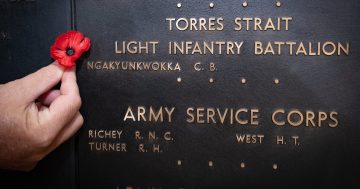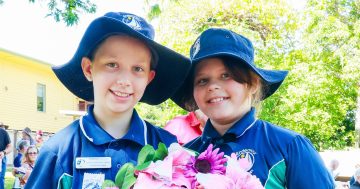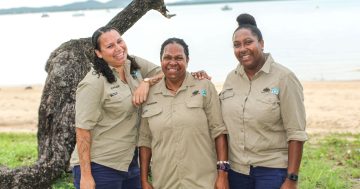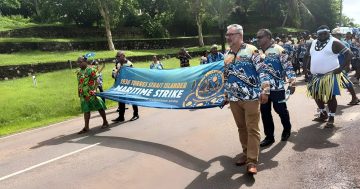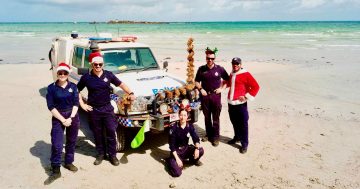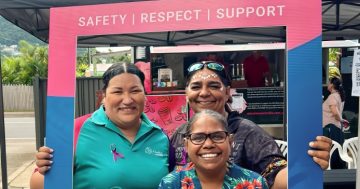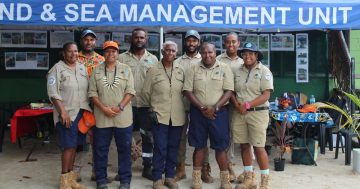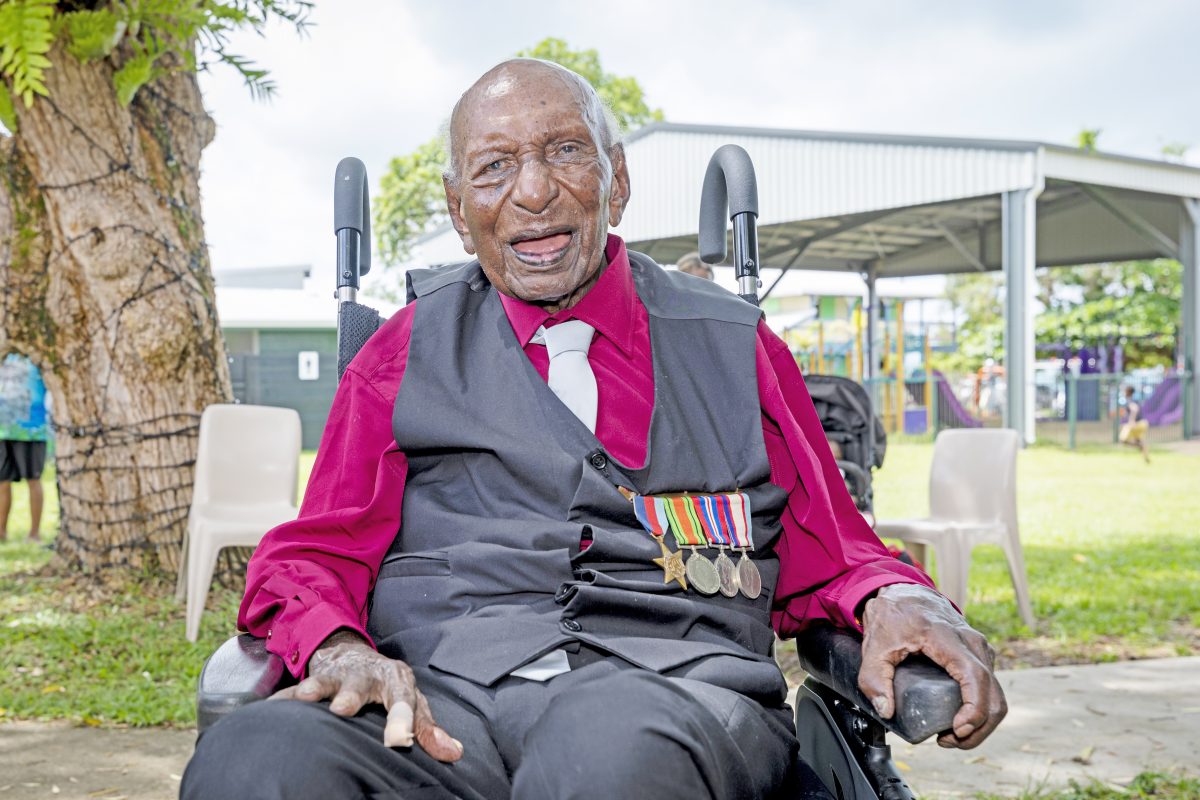
World War II veteran Awati Mau at the Torres Strait Island Light Infantry Battalion 80th anniversary ceremony held on Thursday Island in March this year. Picture: Defence Media
A MASSIVE funeral is expected to be held in Bamaga next week as the Torres Strait and Cape York communities mourn the death of Awati Mau, who was a soldier in the famous Torres Strait Light Infantry Battalion during World War II.
Mr Mau, 97, originally from Saibai Island, was one of two surviving veterans of Australia’s only all-Indigenous military unit. The last surviving member of the Brigade is Mebai Warusam, who still lives on Saibai Island at the age of 99.
Formed in 1943, the Torres Strait Light Infantry Battalion was raised to defend Australia’s northern lands from the threat of Japanese invasion during the Second World War. The battalion, comprising 880 men from across the Torres Strait, initially performed a light infantry role, but soon expanded to conduct a wider range of support functions including engineering, transport, supply and signals.
Mr Mau joined the battalion at age 16 and was attached to the Pioneer Company, undertaking construction and building tasks throughout the islands.
A special service and parade was held on Thursday Island this year to commemorate 80 years since the TSLI’s establishment.
It was an especially proud moment for Mr Mau, who led the parade before being seated beside the chief of the Australian Army Lieutenant-General Simon Stuart.
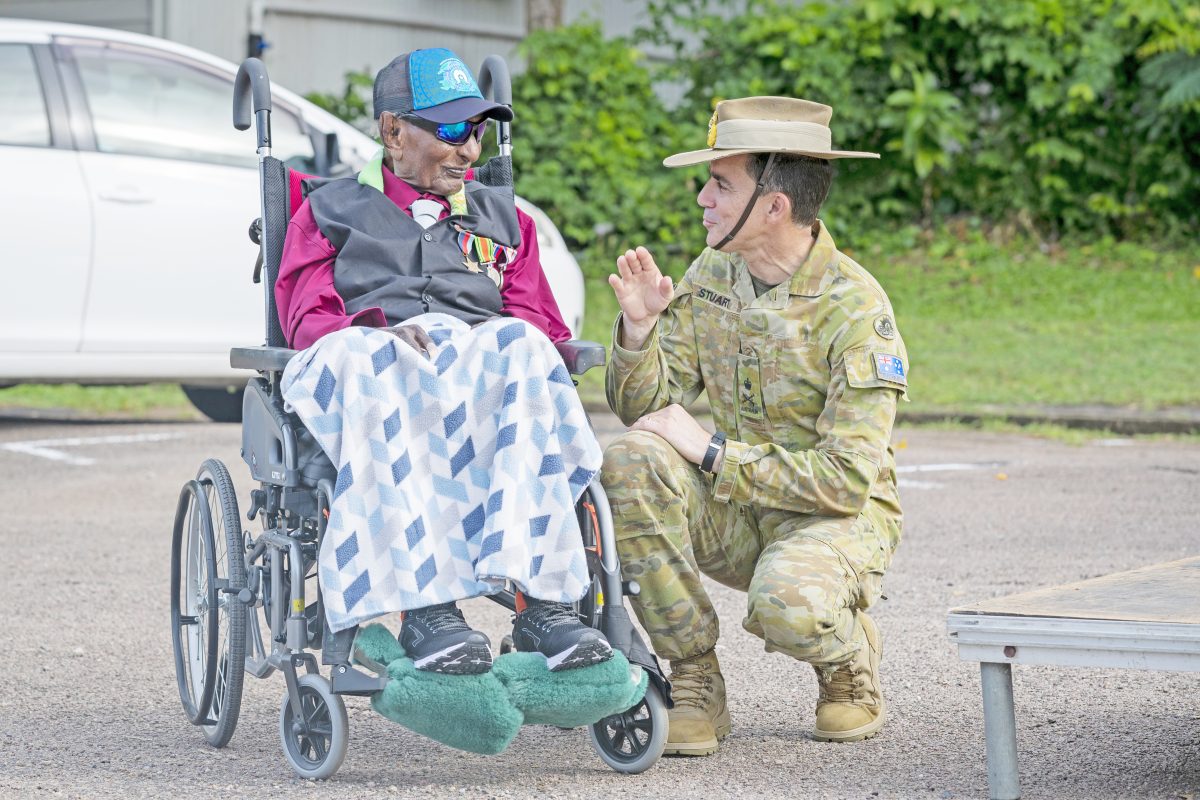
Chief of Army Lieutenant-General Simon Stuart speaks with World War II veteran Awati Mau before the Torres Strait Island Light Infantry Battalion 80th anniversary parade. Picture: Defence Media
Lieutenant-General Stuart said the establishment of the Torres Strait Light Infantry Battalion was an important event to recognise and commemorate 80 years on.
“The role performed by the Torres Strait Light Infantry during our nation’s largest conflict cannot be understated,” he said.
“Almost every man across the Torres Strait Islands volunteered to join the battalion during World War II to defend their homes and their nation.
“The example of service and dedication set by veterans like Mr Mau is an incredible legacy for today’s Australian Army. All current members of Sarpeye (Charlie) Company, 51st Battalion, The Far North Queensland Regiment, are descendants of Torres Strait Light Infantry soldiers, continuing the multi-generational history of service to the Army and Australia.”
Member for Leichhardt Warren Entsch said next Friday’s funeral at St George’s Anglican Church would be both a sad day and a celebration of a great Australian.
“Unfortunately I can’t get there but I’ll be sending up my Torres Strait Light Infantry flag, which I hoped will be draped on his casket,” the MP said.
“Then I want it back so it can be put on Mebai’s casket, and then it’ll be donated to the Torres Strait Heritage Museum on Horn Island.”
Mr Entsch played a key role in the lives of Mr Mau and the other surviving Torres Strait Light Infantry veterans, who weren’t recognised by the Australian Defence Force until the turn of this century.
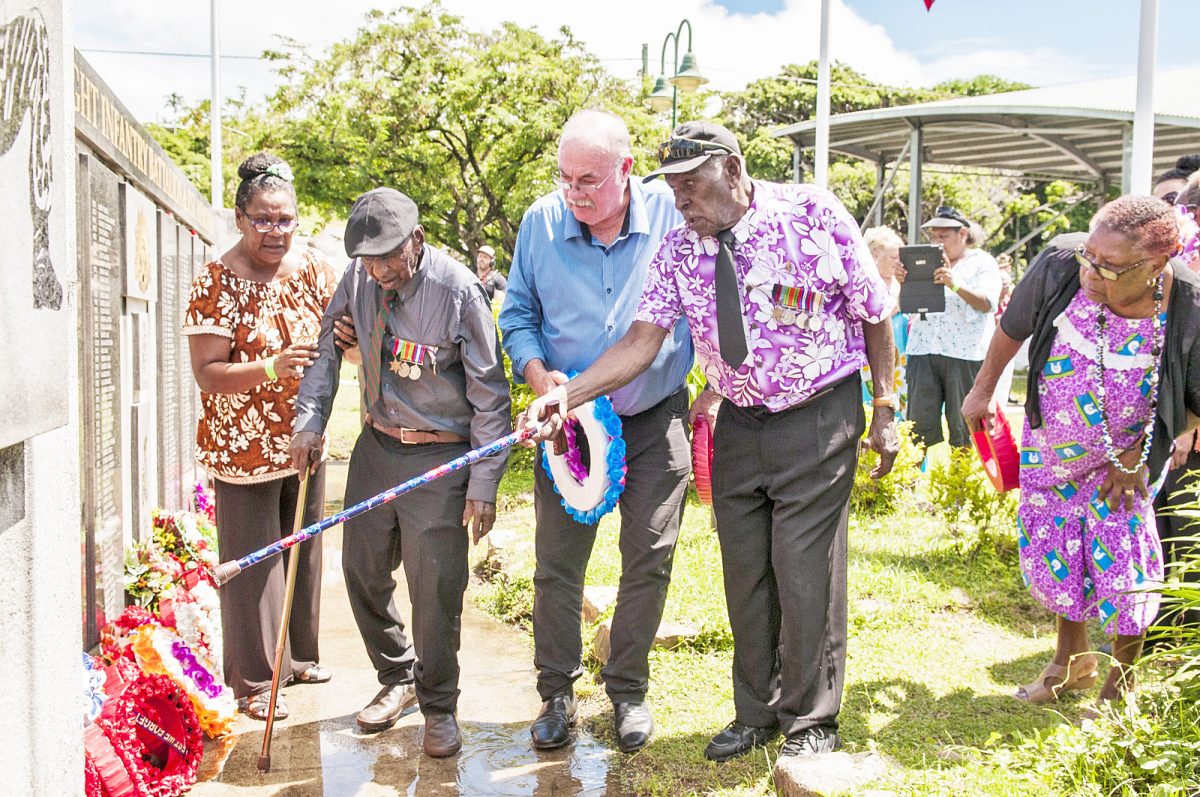
Member for Leichhardt Warren Entsch with Joyce Sebasio and veterans Awati Mau and Mebai Warusam on Thursday Island in 2018. Picture: State Library of Queensland
“It was such a travesty because what people don’t realise is the sacrifice they made to their communities,” he said.
“When they signed up, most of them served four years. It took every able-bodied man who was of age – and plenty who were underage – and deprived them of their community. It took a huge toll on the culture and wellbeing of the Torres Strait.
“As a result, a culture was formed that relied on western food, cigarettes and the drink.”
With the support of locals, Mr Entsch ran a campaign to have every member of the Torres Strait Light Infantry Brigade acknowledged by the ADF.
“It started off with a man called Uncle Etti Pau, who I first met in 1995 and he had taken it upon himself to get justice for those men,” he said.
“He was successful in getting the backpay for them, because those soldiers only got paid a fraction of what the white men did.
“We embarked on a campaign to have members of the Torres Strait Light Infantry Battalion service recognised through the granting of the 1939-45 Star Medal and the Australian Service Medal 1939-45.
“Through this campaign, and with the invaluable support of Vanessa Seekee, we successfully achieved this accomplishment 54 years after their service. Sadly, Uncle Etti Pau passed away just before the final administrative decision was made, and the medals were finally granted in 2001.”
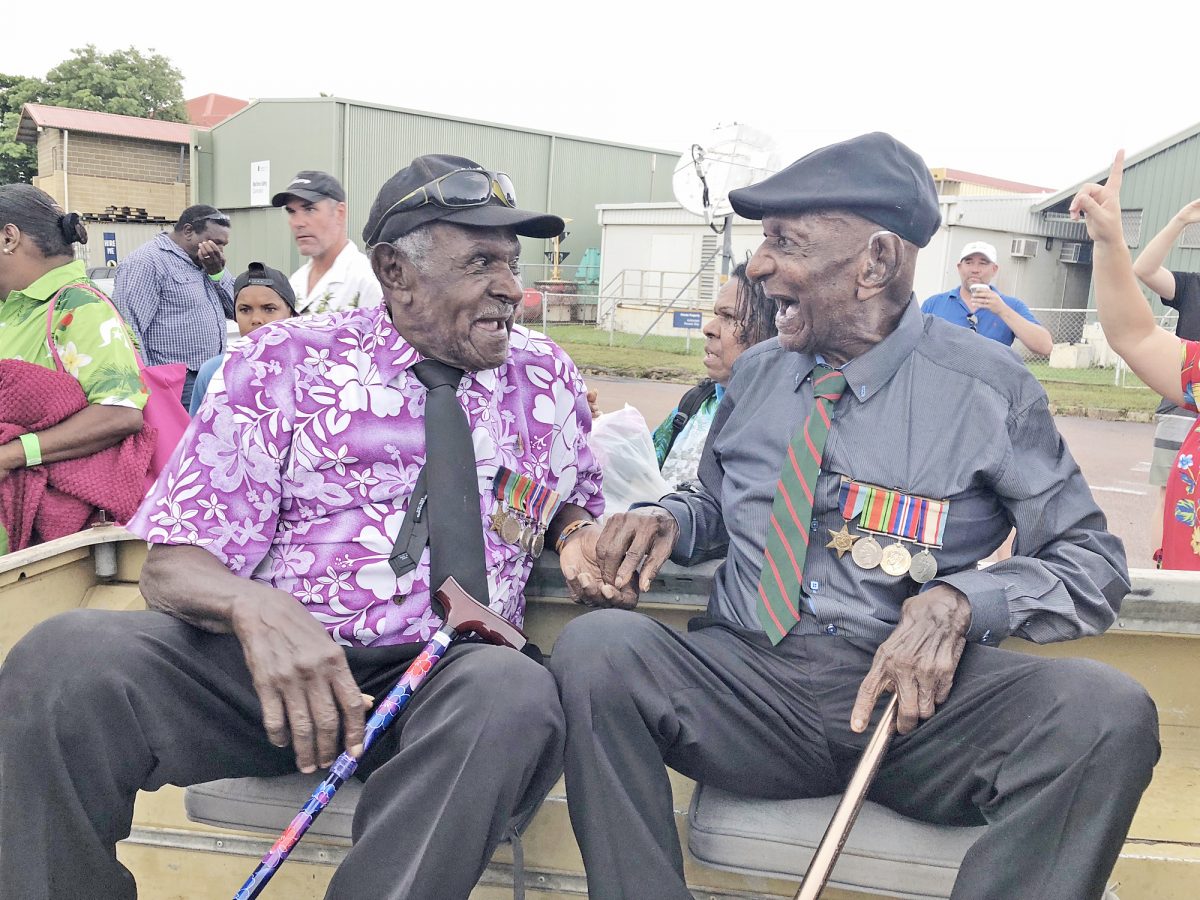
Mebai Warusam and Awati Mau share a laugh on Thursday Island in 2018. Picture: Vanessa Seekee
Mr Entsch said he had fond memories of handing out the medals.
“One of the greatest things I’ve ever done was travelling the Torres Strait and issuing the medals,” he said.
“Back then there were probably 80 or more veterans still alive. We even got the Air Force to get a Hercules and took a whole heap of Torres Strait Islanders to the Canberra War Memorial for a service.
“It’s important that we recognise these great Australians and honour their legacy.”
ARMY CHIEF PAYS TRIBUTE
Below is the address given by the Chief of Australian Army, Lieutenant-General Simon Stuart, at the 80th anniversary of the Torres Strait Light Infantry Battalion on Thursday Island on March 17 this year.
Can I begin by being very grateful for that very warm welcome to country, and by acknowledging the Kaurareg as the traditional custodians of the land and surrounding waters on which we gather this morning, and I pay my respects to Elders past, those of today, and those who will be leading the community in the future.
And because our Army has a long and proud history of Indigenous service, and because today marks one of the significant chapters in our service, I wish to acknowledge all Aboriginal and Torres Strait Islander men and women who have served in our Defence Force in times of peace and war.
It is truly an honour for me to be here on Waibene to celebrate the service of the Torres Strait Light Infantry Battalion, which was raised 80 years ago this month during the dark days of the Second World War.
It was our Army’s first and only Indigenous battalion, and it served proudly and with distinction throughout the Torres Strait and in what was then Dutch New Guinea against the forces of Imperial Japan.
The battalion was raised in the context of Japan’s sweeping victories across the Pacific; a time when a seemingly distant war had suddenly arrived on Australia’s doorstep.
An authoritarian regime neither aligned to our values nor the international rules based order threatened Australia’s security and prosperity.
And as a nation, we responded.
Like all wars, the Second World War was a truly national endeavour for Australia.
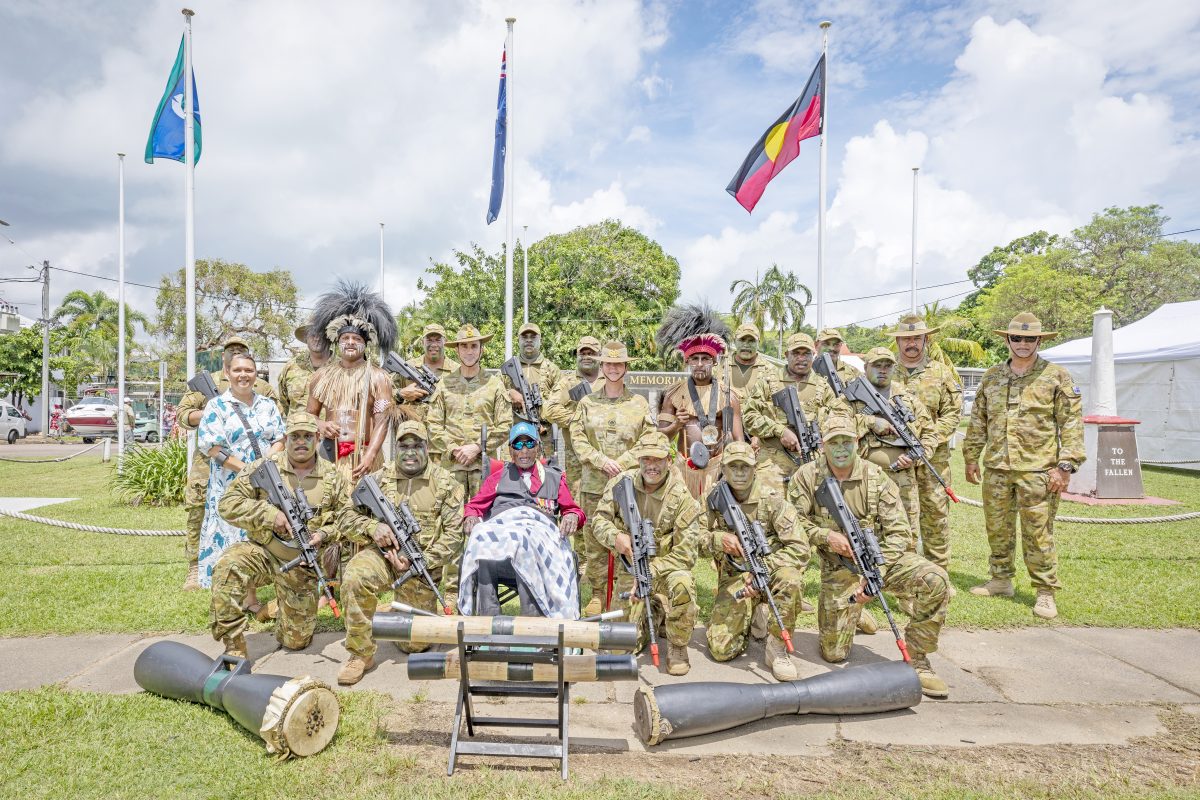
Chief of Army Lieutenant General Simon Stuart with Regimental Sergeant Major – Army Warrant Officer Kim Felmingham, World War II veteran Awati Mau and members of Sarpeye (Charlie) Company, 51 FNQR at the Torres Strait Island Light Infantry Battalion 80th anniversary ceremony held on Thursday Island.
It touched all aspects of our society, our communities, our values and way of life.
And most importantly, its presence was felt here in the Torres Strait – its islands commanding our only maritime chokepoint at the intersection of the Pacific and the Indian oceans.
With Japanese aircraft repeatedly bombing the airfield on Horn Island, the threat of invasion was palpable right here in 1942.
The raising of the Torres Strait Light Infantry Battalion in March 1943 demonstrated what Torres Strait Islanders have done for thousands of years – standing up to protect family, community and country.
This is a remarkable example that resonates and applies across our nation today.
In all, as we’ve heard, some 880 men from the small island communities volunteered for service in Australia’s Military Forces – coming together for the first time as “one Island man”, as one Torres Strait Islander soldier described it.
Among them were Mr Awati Mau and Mr Mebai Warusam, who enlisted in the Army in September 1942 at the age of 16 and 18 respectively.
That’s quite remarkable.
It is an honour and a remarkable day to be with them today as part of this ceremony, something that I’m sure you also share with me.
As two of the battalion’s veterans, I want to acknowledge them, and thank them for all they contributed to the life and society we all enjoy today.
It is astonishing that all but ten men of military age from across the Torres Strait volunteered to serve.
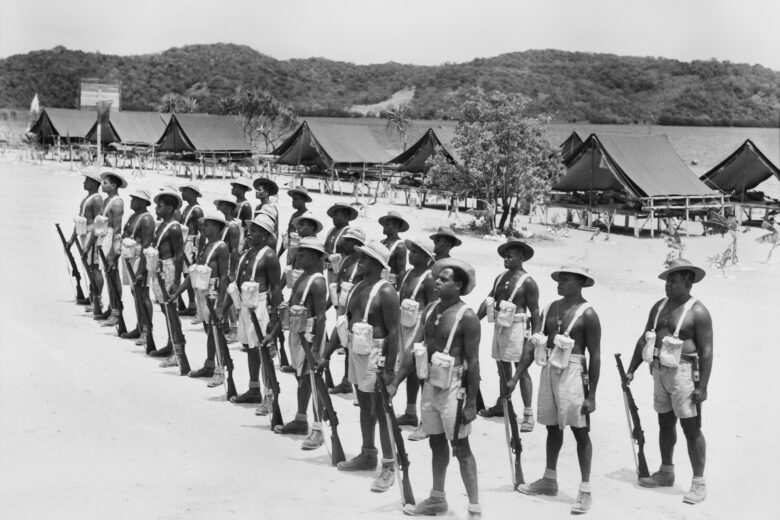
Members of the Torres Strait Light Infantry Battalion on Thursday Island in 1945.
Just as important were the women they left behind, who supported family, endured hardship and made tremendous sacrifices.
We acknowledge the exemplar of service – service before self – that the people of the Torres Strait have provided us as a nation today.
Willingly and dutifully serving our nation, despite the obvious inequalities of the day.
Inequalities in pay and in the recognition of their service.
Indeed, it was not until the mid-1980s – four decades later – that the veterans of the Torres Strait Light Infantry Battalion received their service medals and full pay to which they were entitled.
We acknowledge the significant impact that service had on the traditional way of life.
And we are committed to learning from this past.
We gather today to express our deep pride in their service and their sacrifice.
We are equally proud of the women and men of the Torres Strait communities who serve in our Army today.
The legacy of the Battalion lives on today through the service of the Sarpeye Warriors of Charlie Company, 51st Battalion, the Far North Queensland Regiment.
And reflecting the Torres Strait Island community’s strong response during the Second World War, they and all other Torres Strait Islanders serving in our Army today can trace a family connection to the Torres Strait Light Infantry Battalion.
You, the women and men of the Torres Strait, continue to play an important role in the security of our nation.
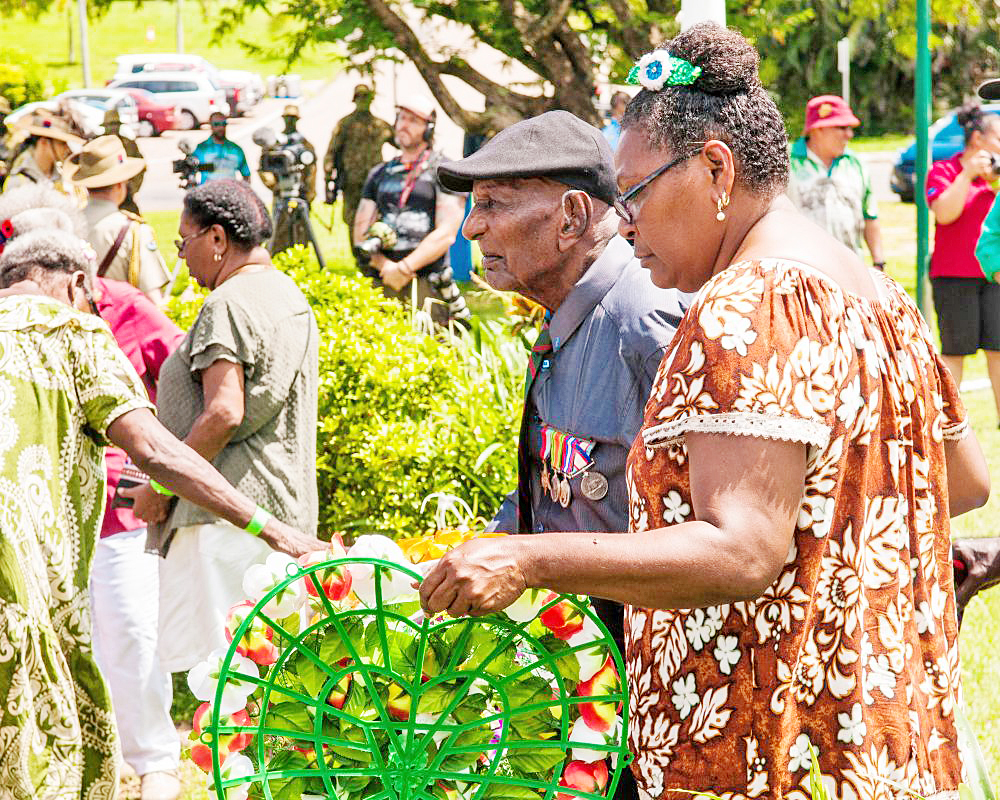
Awati Mau and Joyce Sebasio lay a wreath at Anzac Memorial Park on Thursday Island.
We find ourselves today in challenging strategic circumstances that have an echo from the early 1940s.
Which is why today, Torres Strait Islanders and other Australians are on operations – combining sophisticated technology, an intimate knowledge of county, culture and language to be the eyes and ears of Australia’s north.
You are making a vital contribution to our national interests, and do so as trusted representatives of the communities and people of the Torres Strait.
You are contributing to our Army’s, our ADF’s and our nation’s ongoing history.
We are tremendously proud of you.
Today we celebrate and pay tribute to you – the people of the Torres Strait – and all members of the Torres Strait Light Infantry Battalion for their service to our nation, and the ongoing example of service and the legacy they forged for our Army and our nation.
Lest we forget.


